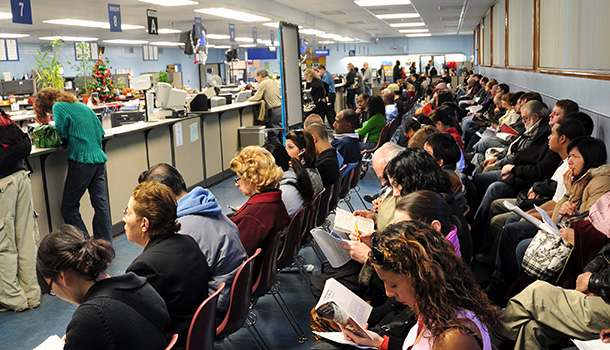
(Photo Credit: Gabriel White/Flickr)
UPDATE – October 10, 2015: Governor Jerry Brown signed AB 1461, also known as the “Motor Voter” bill automatically registers all eligible citizens to vote when they obtain/renew licenses at DMV.
———-
What a difference one election can make. In 2014, California experienced record low voter participation rates despite a gubernatorial election and several ballot measures. Voters just sat it out, tuned it out, or simply forgot it was happening.
This low voter interest in 2014 is juxtaposed with the election of an ambitious and forward-thinking Secretary of State. Secretary of State Alex Padilla stepped into office with a specific agenda, and has been pursuing it since day one: increase voter participation. As part of his efforts to achieve this and increase turnout, Secretary Padilla has sponsored two major election reform bills.
Today we focus on one of those sponsored bills, Assembly Bill 1461, authored by Assemblymember Lorena Gonzalez. This legislation, currently sitting on the Governor’s desk, will require the Department of Motor Vehicles to send to the Secretary of State of any information necessary to automatically complete voter registration for an eligible voter who renews or applies for a driver’s license or state ID, or changes their address. Unless the person affirmatively opts-out of this program, they will be automatically registered to vote. This New Motor Voter Program is touted as a way to increase voter registration by reducing an administrative hurdle for voters.
Within AB 1461, there is a clause that caught our attention. There is a new designation of an “unknown” party preference voter. Generally, readers know of the major and minor parties, in addition to the opportunity to register as No Party Preference. The New Motor Voter Act will register voters that do not designate a party as an “unknown,” but will still be treated as a No Party Preference voter.
“It was felt that there is a real difference between someone who actively marks ‘No Party Preference’ and someone who doesn’t mark anything,” said Sam Mahood, press secretary for Secretary of State Alex Padilla.
This addition of the “unknown voter” may also have the potential for unknown consequences. To help clear up any confusion, we asked election professionals what this change means for voters.
“Many voters, when filling out their registration card, do not mark a party and by default they go in the No Party Preference (NPP) category,” explained Jill LaVine, voter registrar for Sacramento County. For “unknown” voters, “this is the same procedure we do for those that don’t complete their registration card.”
Mahood echoed the analysis from the local registrar: “Voters listed with an ‘unknown’ party preference would be functionally treated as no party preference, but as far as identifying subgroups, it was felt that ‘unknown’ warranted its own category.”
The New Motor Voter Program will inevitably lead to more registered voters, many of whom may be voting for the first time. This can present some hiccups for modern campaigns that use highly refined voter data to target voters. How does a campaign target an unknown voter in the era of California’s Top Two Primary?
“This is a political environment where No Party Preference or ‘Unknown’ registration voters are courted much more than they might have in years past,” said data guru Paul Mitchell from Political Data, Inc., when asked how campaigns might reach out to these newly registered voters. “For those without a prior registration as a guide, we expect campaigns will do what they have with other new registrants: use age, geography, ethnicity, gender, household partisanship, and other factors to drive targeting decisions.”
If signed by the Governor Jerry Brown, California’s New Motor Voter Act will be the most expansive change to voter registration since the rollout of online voter registration prior to the 2012 election.
So, the takeaway: for voters who are automatically registered through this new program and decide not to choose a party preference, rest assured your “unknown” preference will not prevent you from being a full-fledged participant in California’s vibrant democracy. And whether you like it or not, campaigns will be working to earn your vote because every vote matters.

